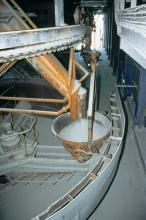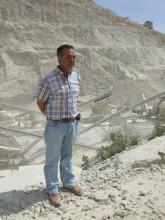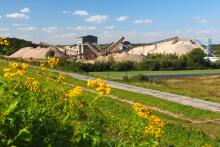During my visits to quarries and construction equipment manufacturers over the last 12 months, one subject comes up again and again - the cost of fuel.
Over the last month, there rarely seems to have been a day when the topic has not been headline news. The price of oil has reached an all time high and market analysts are predicting that it could rise even higher, reaching US$150 a barrel by July. Across Europe there have been protests by major fuel users about the rising costs and demands for action by governments to cut tax imposed on fuel to stem inflation.
In France it is the fishermen and farmers that have led protests claiming that the cost is crippling their businesses, while in Bulgaria truck drivers created a blockade around a ring road of the capital Sofia. In the UK truck drivers and fishermen have led protests in London. Fishermen in Portugal have remained in port and Spanish fishermen are voicing plans to carry out similar action. In the Netherlands, truckers have displayed illuminated signs encouraging drivers to sound their horns in protest at the rising fuel prices. In Spain, blockades by truck drivers have led to food shortages and angry protests have resulted in the deaths of two drivers.
The message that the rising cost of fuel is impacting on competitiveness of businesses in Europe is loud and clear. The issue is also a big problem for the European aggregates industry and the result is likely to have a knock-on effect on the construction sector too.
The higher fuel cost means that ex-works prices for aggregates - as well as cement, concrete and asphalt - are likely to rise. It will be interesting to look at the effect in this year's aggregate pricing report but it is already being felt in the aggregate loading yards in Europe. The quarry I visited in Ibiza - Cantera Can Orvay - for this issue's quarry profile had just raised its prices to offset higher fuel costs for production.
The other issue for the aggregates sector is the cost of delivery, which can account for up to 40% of the actual price of the material delivered to site. With fuel cost set to rise further, this percentage could climb this year.
For many quarries road transport is the only option, but during the course of writing this issue of ABE, I had the chance to look at some of the alternative methods of delivery that are used in Europe. In France's Trimouns talc quarry in Luzenac a cable car system is used to transfer material from the mountain top site to the processing plant in the valley below. Also in France,
Customers are also beginning to address the need for sustainable transport - in June London's Olympic Delivery Authority awarded the contract for aggregates supply for the 2012 Olympics partly based on the bidder's ability to deliver by sustainable means. The contract called for a minimum of 50% of deliveries by sustainable transport, but
Construction equipment manufacturers are also working to reduce fuel consumption -
While high oil prices look set to remain an issue in Europe, news of these alternatively powered machines and the focus on sustainable delivery means that the industry is working to improve things for the future.









